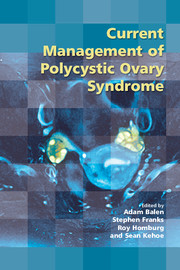Book contents
- Frontmatter
- Contents
- Participants
- Declarations of personal interest
- Preface
- 1 Overview and definitions of polycystic ovary syndrome and the polycystic ovary
- 2 Genetics and pathogenesis of polycystic ovary syndrome
- 3 Ethnic variations in the expression of polycystic ovary syndrome
- 4 Quality of life for women with polycystic ovary syndrome
- 5 Insulin resistance, the metabolic syndrome and polycystic ovary syndrome
- 6 Management of polycystic ovary syndrome through puberty and adolescence
- 7 Long-term health risks of polycystic ovary syndrome
- 8 Approaches to lifestyle management in polycystic ovary syndrome
- 9 Management of obesity in polycystic ovary syndrome, including anti-obesity drugs and bariatric surgery
- 10 Definition of hyperandrogenism
- 11 Treatment of hyperandrogenism in polycystic ovary syndrome
- 12 Choices in the treatment of anovulatory polycystic ovary syndrome
- 13 Predictors of ovarian response to ovarian stimulation: progress towards individualised treatment in ovulation induction
- 14 Surgical management of anovulatory infertility in polycystic ovary syndrome
- 15 The role of insulin-sensitising drugs in the treatment of polycystic ovary syndrome
- 16 The role of in vitro maturation of oocytes for anovulatory polycystic ovary syndrome
- 17 Acupuncture and/or herbal therapy as an alternative or complement for relief of polycystic ovary syndrome-related symptoms
- 18 Consensus views arising from the 59th Study Group: Current Management of Polycystic Ovary Syndrome
- Index
18 - Consensus views arising from the 59th Study Group: Current Management of Polycystic Ovary Syndrome
Published online by Cambridge University Press: 05 July 2014
- Frontmatter
- Contents
- Participants
- Declarations of personal interest
- Preface
- 1 Overview and definitions of polycystic ovary syndrome and the polycystic ovary
- 2 Genetics and pathogenesis of polycystic ovary syndrome
- 3 Ethnic variations in the expression of polycystic ovary syndrome
- 4 Quality of life for women with polycystic ovary syndrome
- 5 Insulin resistance, the metabolic syndrome and polycystic ovary syndrome
- 6 Management of polycystic ovary syndrome through puberty and adolescence
- 7 Long-term health risks of polycystic ovary syndrome
- 8 Approaches to lifestyle management in polycystic ovary syndrome
- 9 Management of obesity in polycystic ovary syndrome, including anti-obesity drugs and bariatric surgery
- 10 Definition of hyperandrogenism
- 11 Treatment of hyperandrogenism in polycystic ovary syndrome
- 12 Choices in the treatment of anovulatory polycystic ovary syndrome
- 13 Predictors of ovarian response to ovarian stimulation: progress towards individualised treatment in ovulation induction
- 14 Surgical management of anovulatory infertility in polycystic ovary syndrome
- 15 The role of insulin-sensitising drugs in the treatment of polycystic ovary syndrome
- 16 The role of in vitro maturation of oocytes for anovulatory polycystic ovary syndrome
- 17 Acupuncture and/or herbal therapy as an alternative or complement for relief of polycystic ovary syndrome-related symptoms
- 18 Consensus views arising from the 59th Study Group: Current Management of Polycystic Ovary Syndrome
- Index
Summary
Diagnosis/pathophysiology
The Rotterdam European Society of Human Reproduction and Embryology (ESHRE)/American Society for Reproductive Medicine (ASRM) consensus definition for polycystic ovary syndrome is the most pragmatic and appropriate one.
There are significant ethnic differences in the expression of hyperandrogenism and metabolic disease.
A definitive diagnosis of polycystic ovary syndrome can be difficult to achieve in adolescence and an early diagnosis should be re-evaluated in adulthood.
Psychological wellbeing is adversely affected by polycystic ovary syndrome. Health-related quality of life (HRQoL) assessment should be considered as part of the woman's routine clinical care.
Management
Lifestyle and metabolic aspects
5. The management of polycystic ovary syndrome (including its long-term health risks) is best delivered by a multidisciplinary approach, including dietary and educational counselling, exercise training, stress management and psychosocial support.
6. All women with polycystic ovary syndrome should be assessed for the risk of developing impaired glucose tolerance and type 2 diabetes.
7. Preconception counselling in women with polycystic ovary syndrome seeking fertility should include potential obstetric risks.
8. Weight loss should be emphasised in the treatment of women with polycystic ovary syndrome who are overweight and for the prevention of type 2 diabetes. There is no evidence of superiority of a particular type of diet for women with polycystic ovary syndrome. If the woman's body mass index is greater than 35 kg/m2, bariatric surgery should be considered. Fertility treatment should be deferred until after the initial period of rapid weight loss.
Keywords
- Type
- Chapter
- Information
- Current Management of Polycystic Ovary Syndrome , pp. 213 - 216Publisher: Cambridge University PressPrint publication year: 2010

